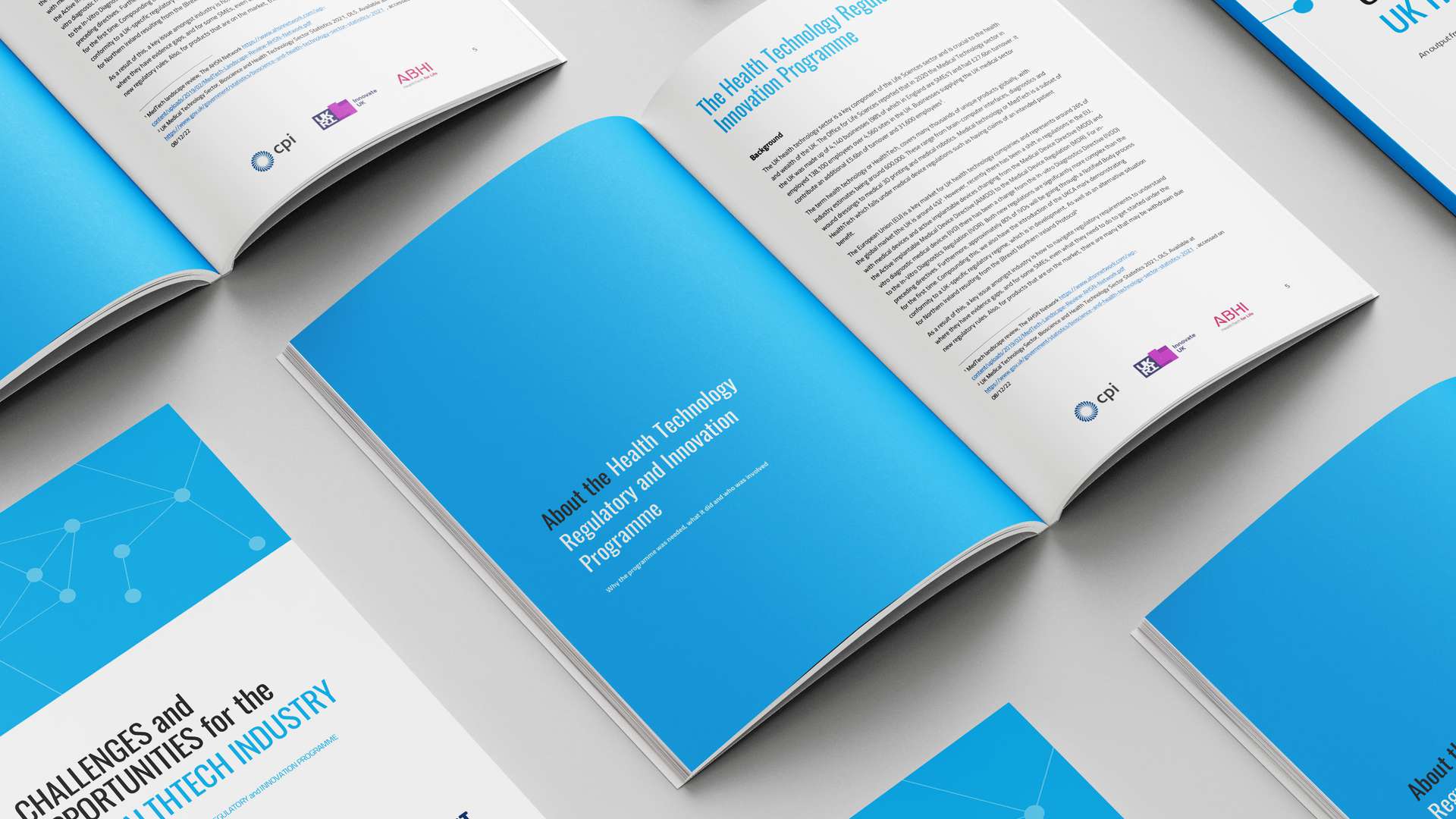HealthTRIP Project


The Health Technology Regulatory Innovation Programme (HealthTRIP) supported UK HealthTech SMEs to meet medical device regulatory requirements. The programme was funded by Innovate UK and led by CPI in partnership with the Association of British HealthTech Industries (ABHI).
The programme provided grant funding (funding now closed) and now offers a series of free regulatory training through online webinars. It has produced a comprehensive overview of the challenges experienced by SMEs within the UK’s health technology industry and a roadmap for the future development of the in vitro diagnostics (IVD) subsector, with the reports available to download below.
A recent, independent validation from a research agency, Urban Foresight, underscores the value of this programme, including keeping products on the market and bringing new products to new markets.
Health Technology or HealthTech refers to technologies that can diagnose or improve the lives of individuals through a digital or physical technology that does not work through pharmacological means. It is made up of medical technology and wellness devices. According to the Office of Life Sciences, the UK medical technology sector generates a turnover of over £30 billion a year, employs 145,481 people and is represented by 4,353 businesses spread over almost 5,000 sites. MedTech includes in vitro diagnostics, (IVD), where human health samples are analysed outside of the body. IVD has a global market value of £71bn and is growing rapidly with new developments in technology, changes in diagnosis methodology, and the growing incidence of chronic disease.
The MedTech sector is highly regulated across the globe and has been in a state of flux across the UK and EU over the last few years. This has resulted in uncertainty and delays in the accreditation processes for medical devices impeding the progression of new technologies towards commercialisation. Specifically, new EU regulations have been introduced for MedTech and IVD which are significantly more complex than the preceding directives. As a result of these new directives, 85% of IVD products now require notified body oversight, compared with 20% previously.
As around 85% of MedTech companies in the UK are SMEs, which rarely have in-house regulatory expertise, this uncertainty creates significant financial and time burdens in bringing innovative new medical devices to market. Existing products on the market are also at risk of being withdrawn due to increasing regulatory burdens and compliance costs.
Removing these barriers by providing expert support and training would enhance the UK’s ability to attract investment to the MedTech industry and strengthen its ability to develop innovative products. Regulatory support could also build an ecosystem for commercialisation of products in the UK, enabling UK innovators to become established as major companies.
The goal of the Health Technology Regulatory Innovation Programme is to provide a wide package of support to the UK HealthTech industry to help them succeed and get their products to market in a changing regulatory environment.
Sharing the successes of the programme will help to inform UK government stakeholders on the support the industry needs to become globally competitive. It will raise awareness of the programme’s support and resources for SMEs and drive engagement with the industry.
The main achievements of the Health Technology Regulatory Innovation Programme to date are as follows:
- 277 UK companies each received a grant of up to £30,000 for regulatory support, helping to keep both existing products on the market and helping new products overcome regulatory barriers to commercialisation.
- We have delivered webinars on regulatory affairs.
- Clinical.
We also ran “ask the expert” webinars, click here for Session 1 and Session 2:
- We published the ‘Challenges and Opportunities for the UK HealthTech Industry’ report, based on data from over 350 SMEs and HealthTech stakeholders, The report makes recommendations for future funding and policy decisions.
- We have published the ‘A strategic technology roadmap for the UK IVD industry’ in collaboration with Cambridge Design Partnership (CDP). which outlines what critical innovations are needed in the UK to develop promising research and create the scale-up and manufacturing infrastructure to meet global challenges. This was based on surveys and engagements with over 150 companies across the UK.
CPI engaged Urban Foresight to investigate the value of the programme and its impact. The report found two key areas to highlight;
1. HealthTRIP is an economically impactful programme that should be repeated.
Supported SMEs were found to be able to launch new products in the UK, EU, US and other international markets. In reference to the UK market — SMEs were able to retain products in the UK (23.8%), boosting the economy substantially. Although the project has only recently concluded, the estimated total GVA impact so far is between £1.47m and £6.73m
2. HealthTRIP enabled SMEs to speed-up and de-risk their innovations.
The survey found that 68% of supported SMEs managed to accelerate HealthTech products closer to market. As well as this, 90% of supported SMEs managed to upskill their own employees, boosting the skills of the HealthTech ecosystem in the UK. The project was ultimately found to have the potential to generate collective savings for supported SMEs ranging from £13.6m to £59.7m over the next 10 years
Currently, the UK’s health technology industry is very fragmented. The HealthTRIP reports will help create a clearer picture of the industry’s future to influence policy and attract investment.
Recommendations made by the programme will also help to:
- Support the industry in becoming more sustainable
- Improve access to target markets including the NHS and the US
- Tackle skills shortages, supply chain connectivity and IP challenges
- Close current gaps around scale-up, manufacturing and digital health
The collective vision is of the UK as an industry nucleus for world-leading businesses. The UK also has the potential to become a world leader in the IVD industry.
This could benefit the healthcare system in the long term, leading to advanced ability to diagnose and treat, and enhancing the quality of patient care.


To find out more about how we can work together, please enter your details below.